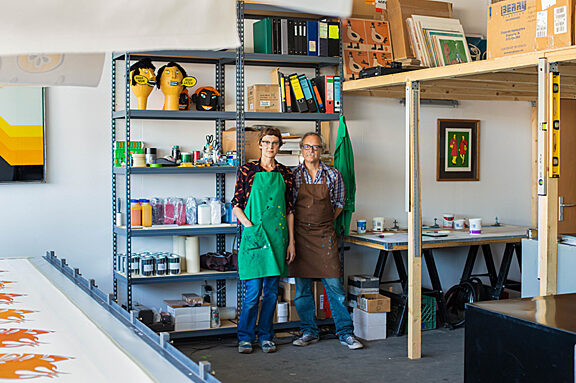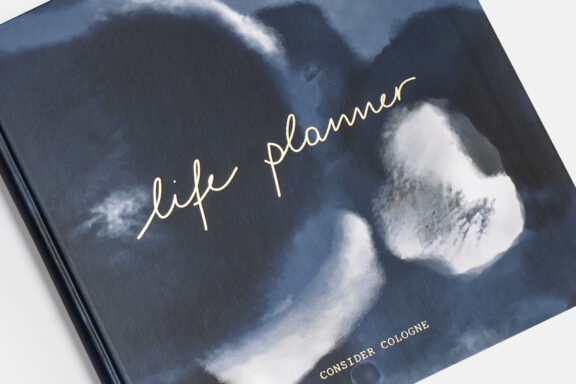Doc Simons’ Notes
Thoughts centering on notes, notebooks, and notebook owners.

If you want an aura of mystery surround your notebook, you can just follow the example of Leonardo da Vinci. Most of his journals are written in mirror-image cursive - a spleen that has secured the attention of conspiracy aficionados worldwide. The most likely explanation, however, is that left-handed Leonardo simply wrote quicker that way. And even if that does not appear too practical for you, this nevertheless demonstrates the notebook's flexibility. You can write in it from left to right, top to bottom or upside down - do whatever you like.
Time for a Renaissance
Slowly but surely, the notebook returned. For years it had withdrawn to the darkest of corners of shopping malls - i.e. esoteric shops - to dwell amongst magic stones and rune necklaces.
It seemed to fit right in among the relics of old times and forgotten culture. Notebooks? Paper? Thanks, but no thanks. After all, the world was at the dawning of a new age - the age of electronic gadgets, which promised to supersede all paper. The only thing that seemed to fit the times was the filofax, which does in fact appear to be a preliminary study for digital assistants due to its calendar functions and more or less useful information (and who doesn't need to look up letters of the Morse alphabet or the Mauritian flag every now and then?). The filofax did contain five empty pages for notes, but they were sure to remain blank forever. After all, it was only five pages, so whatever you would want to write down on this limited amount of room had to be pretty spectacular. So spectacular, in fact, that it most certainly didn't occur. Imagine spending what little space there was on something as trivial as a shopping list - embarrassing. Which is why shopping lists and all other notes were written on tiny pieces of paper instead. These contributed to the enormous volume of the ever-growing filofax and also led to a vast array of pockets, buttons and zippers.
Along came the PDA. And along with it came the usual technical difficulties. Making a quick note or storing business cards were not part of the personal digital assistant's job description. All of a sudden, the paper notebook gained a lot of new qualities, such as the impressive mileage of the battery, the safe memory and the short amount of time required for starting up. And if a paper notebook crashed, all you had to do was pick it up again.
The quiet companion
Being an intellectual isn't easy today. Hand-rolled cigarettes, black turtlenecks and thickly rimmed glasses - once the signs of the trade - are anything but up to date. Glasses are too cliché, turtlenecks make your neck seem short and smoking is bad for your health. So they are out of the question, since looking good is the highest priority. A quick wit now and then is fine. But appearing - let alone being - clever permanently is far too exhausting. It is time for a new insignia, one that says 'hello, I'm a deep person.' A passport for the intellectual, signifying the self-proclaimed status as a profound thinker. Also, black would be nice. It's not only tradition but it also goes with everything.
No problem. Just invent a little black notebook and give it a history of its own. (You know which one - the legendary book that so on and so on used in the year so and so.) What does the buyer expect from this historical notebook? The ability to write like the famous predecessors, turning the neat list of phone numbers - eagerly collected in countless nights out - into a modern form of poetry? Or is the notebook's pedigree merely a distinguishing anecdote for parties? But be careful when the conversation actually begins to focus on the previous owners. Someone might actually ask who exactly they were and what exactly they did write into their notebooks. Failure to answer may lead to embarrassing scenes that make you wish you had bought a turtleneck instead.
Fearing the blank page
Notebooks turn thinkers into writers. And they don't just reach pragmatic writers or sticky note aficionados - these types have always been writing, anyway. We're talking about the creative ones, authors, and collectors of stories. For them, the notebook can be a protection against what they dread most: the writer's block. The fear of the blank page. The primal fear of all writers. When the unstained, clear white sheet of paper in front of you claims that anything is possible right now - then every false start, every crossed-out word, and every entangled line of argument becomes a monument of your incapability.
Computers promise to be of help, as every step can be undone, every word unwritten. Or so it seems. Cause while paper may have been patient, the efficient machine is eager to point out the rapid passing of time (note for masochists: a PC displays the clock in the lower right, an Apple at the upper right). The inviting blinking of the cursor slowly but surely turns into a soft ticking - the ticking of clock. Running. Out. Of. Time. And if this doesn't annoy you enough already, the underemployed PC sardonically sends you its minion - the hyperactive paper clip offering help for writing a letter, regardless of whether you are in fact writing a letter or something else entirely.
The notebook, on the other hand, is quiet - and small. Its pages are small enough for you to cope with and do not evoke the feeling of having to paint the ceiling of the Sistine Chapel. The pages of the notebook are quickly filled, so you will turn the pages very often. The blank page therefore becomes a routine and the routine reduces fear. Also, the name 'notebook' releases you of any pressure of being perfect. By definition, whatever you write down is just a note, preliminary, and incomplete. And if it turns out to be good - even better. For every notebook is surrounded by an aura of secrecy or privacy - tempting everyone to read it. So just 'forget' your notebook in a café, include a business card and your breakthrough is only a matter of time.



